Nursing Reflection: Expectations of Older Person Health and Wellbeing
VerifiedAdded on 2022/11/13
|6
|1318
|144
Homework Assignment
AI Summary
This assignment presents a nursing student's reflective writing on the care of older persons, addressing the influence of societal perceptions of aging on healthcare expectations. The reflection, structured using the DIEP strategy (Describe, Interpret, Evaluate, Plan), explores common stereotypes about the elderly and their impact on nursing practice, alongside the student's personal experiences involving ethical dilemmas related to patient care, specifically focusing on denture-related stomatitis and family requests. The reflection also defines key terms such as 'aged,' 'ageing,' 'elderly,' and 'old,' and includes a C.R.A.P. test evaluation of a chosen peer-reviewed journal article to assess its currency, reliability, authority, and purpose within the context of palliative care and nursing ethics. The student identifies personal shortcomings in handling ethical situations, emphasizes the importance of adhering to the code of ethics, and outlines plans for future practice to ensure precise patient care and effective communication with families. The assignment includes a detailed reference list.
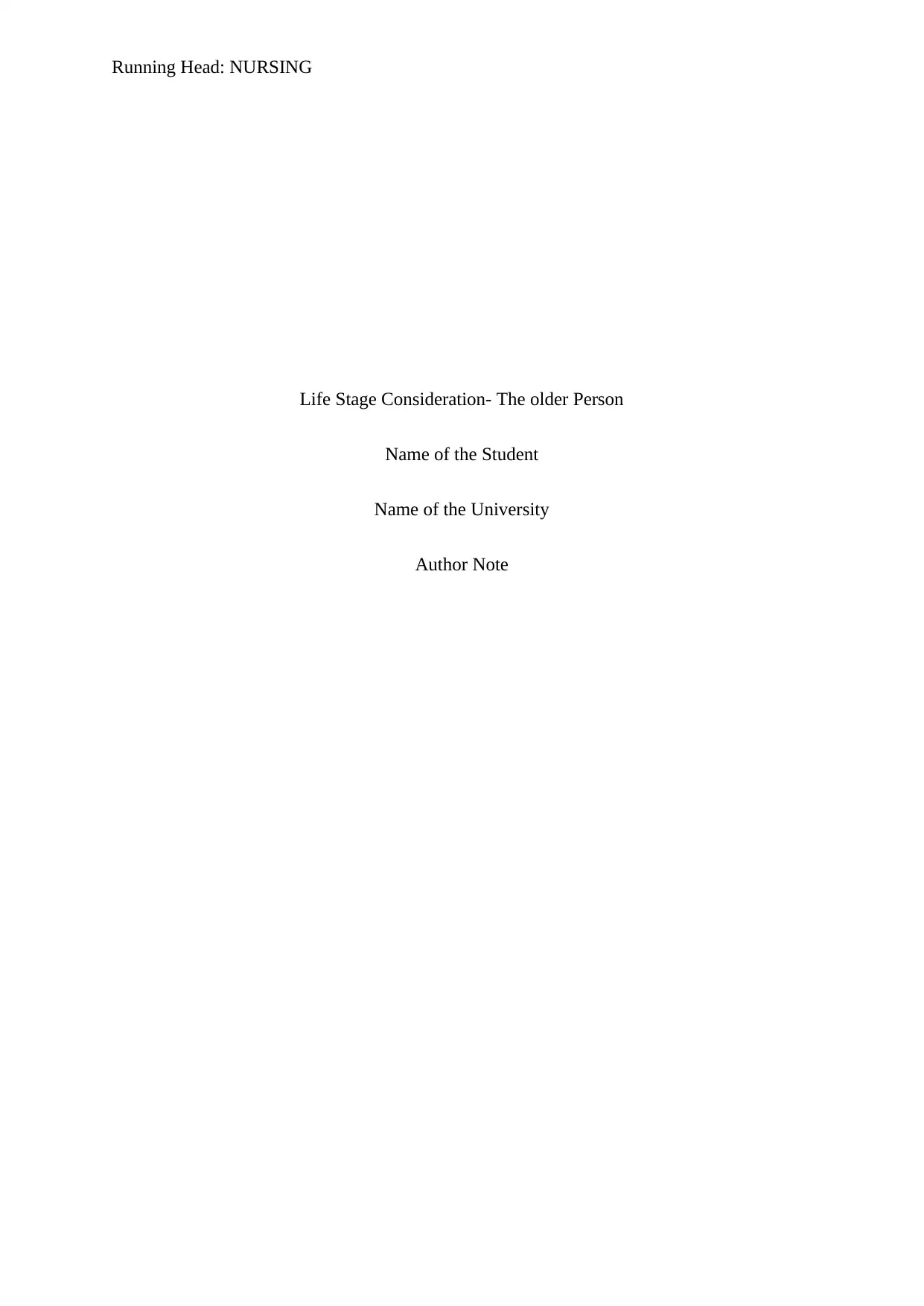
Running Head: NURSING
Life Stage Consideration- The older Person
Name of the Student
Name of the University
Author Note
Life Stage Consideration- The older Person
Name of the Student
Name of the University
Author Note
Paraphrase This Document
Need a fresh take? Get an instant paraphrase of this document with our AI Paraphraser
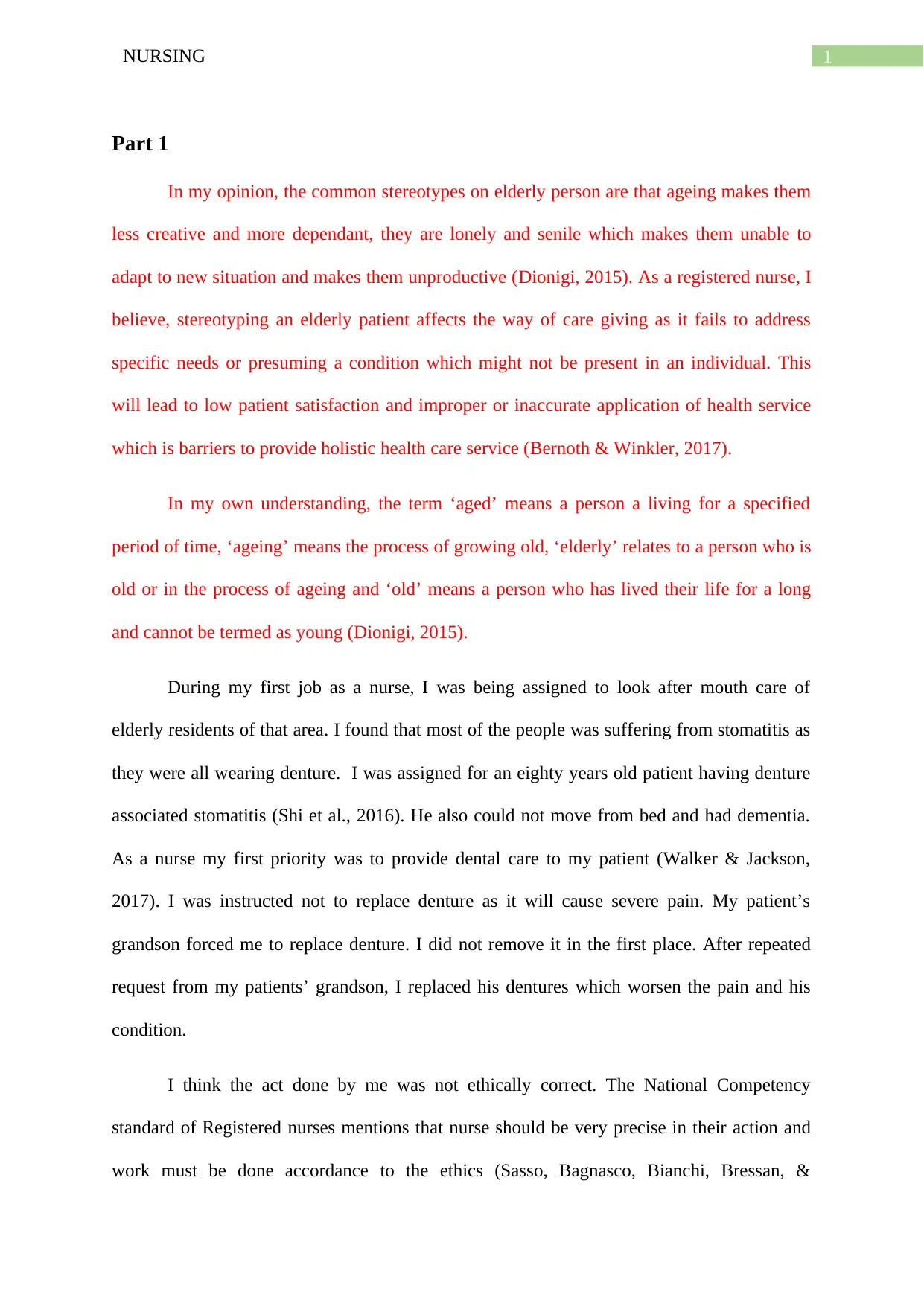
1NURSING
Part 1
In my opinion, the common stereotypes on elderly person are that ageing makes them
less creative and more dependant, they are lonely and senile which makes them unable to
adapt to new situation and makes them unproductive (Dionigi, 2015). As a registered nurse, I
believe, stereotyping an elderly patient affects the way of care giving as it fails to address
specific needs or presuming a condition which might not be present in an individual. This
will lead to low patient satisfaction and improper or inaccurate application of health service
which is barriers to provide holistic health care service (Bernoth & Winkler, 2017).
In my own understanding, the term ‘aged’ means a person a living for a specified
period of time, ‘ageing’ means the process of growing old, ‘elderly’ relates to a person who is
old or in the process of ageing and ‘old’ means a person who has lived their life for a long
and cannot be termed as young (Dionigi, 2015).
During my first job as a nurse, I was being assigned to look after mouth care of
elderly residents of that area. I found that most of the people was suffering from stomatitis as
they were all wearing denture. I was assigned for an eighty years old patient having denture
associated stomatitis (Shi et al., 2016). He also could not move from bed and had dementia.
As a nurse my first priority was to provide dental care to my patient (Walker & Jackson,
2017). I was instructed not to replace denture as it will cause severe pain. My patient’s
grandson forced me to replace denture. I did not remove it in the first place. After repeated
request from my patients’ grandson, I replaced his dentures which worsen the pain and his
condition.
I think the act done by me was not ethically correct. The National Competency
standard of Registered nurses mentions that nurse should be very precise in their action and
work must be done accordance to the ethics (Sasso, Bagnasco, Bianchi, Bressan, &
Part 1
In my opinion, the common stereotypes on elderly person are that ageing makes them
less creative and more dependant, they are lonely and senile which makes them unable to
adapt to new situation and makes them unproductive (Dionigi, 2015). As a registered nurse, I
believe, stereotyping an elderly patient affects the way of care giving as it fails to address
specific needs or presuming a condition which might not be present in an individual. This
will lead to low patient satisfaction and improper or inaccurate application of health service
which is barriers to provide holistic health care service (Bernoth & Winkler, 2017).
In my own understanding, the term ‘aged’ means a person a living for a specified
period of time, ‘ageing’ means the process of growing old, ‘elderly’ relates to a person who is
old or in the process of ageing and ‘old’ means a person who has lived their life for a long
and cannot be termed as young (Dionigi, 2015).
During my first job as a nurse, I was being assigned to look after mouth care of
elderly residents of that area. I found that most of the people was suffering from stomatitis as
they were all wearing denture. I was assigned for an eighty years old patient having denture
associated stomatitis (Shi et al., 2016). He also could not move from bed and had dementia.
As a nurse my first priority was to provide dental care to my patient (Walker & Jackson,
2017). I was instructed not to replace denture as it will cause severe pain. My patient’s
grandson forced me to replace denture. I did not remove it in the first place. After repeated
request from my patients’ grandson, I replaced his dentures which worsen the pain and his
condition.
I think the act done by me was not ethically correct. The National Competency
standard of Registered nurses mentions that nurse should be very precise in their action and
work must be done accordance to the ethics (Sasso, Bagnasco, Bianchi, Bressan, &
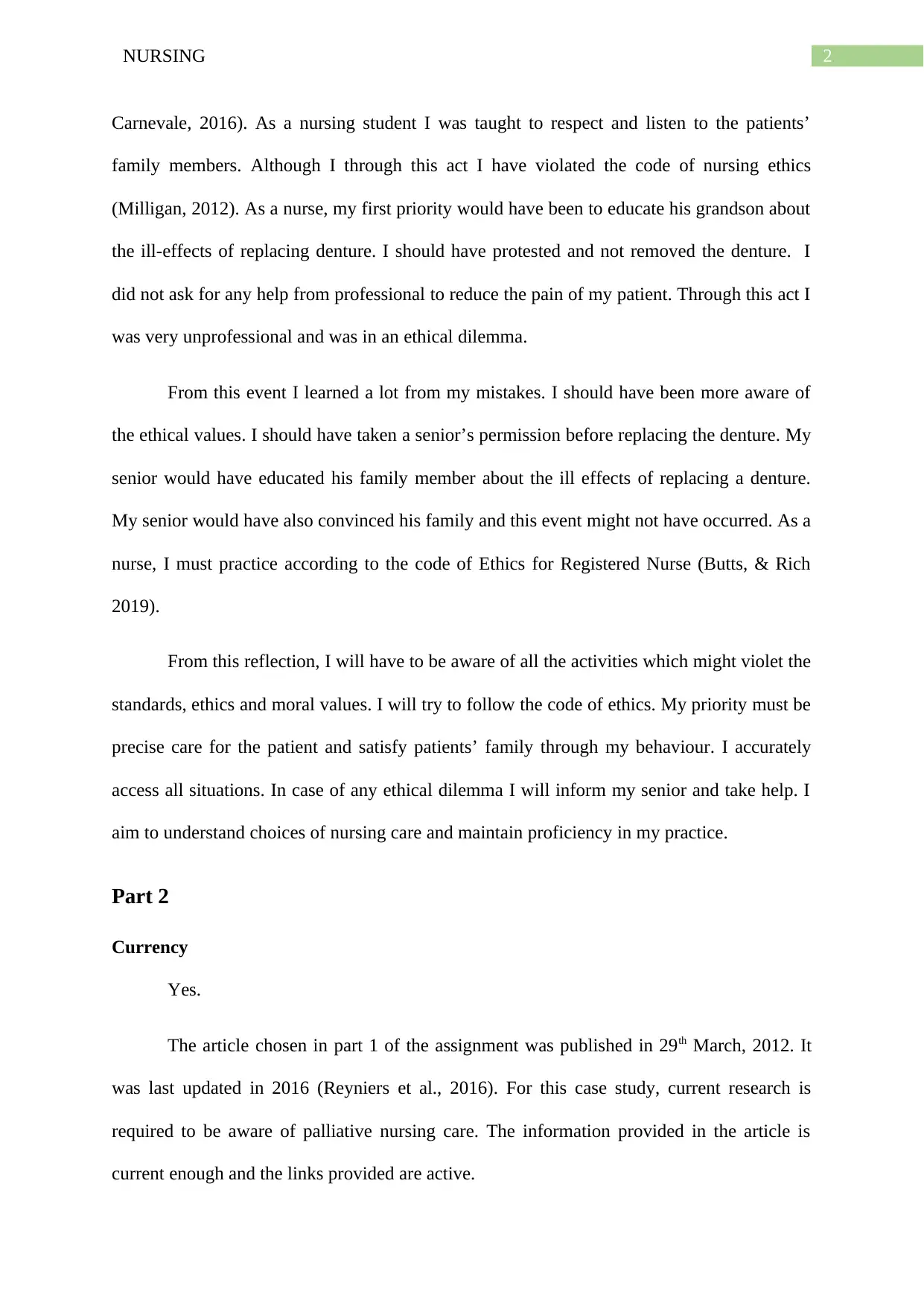
2NURSING
Carnevale, 2016). As a nursing student I was taught to respect and listen to the patients’
family members. Although I through this act I have violated the code of nursing ethics
(Milligan, 2012). As a nurse, my first priority would have been to educate his grandson about
the ill-effects of replacing denture. I should have protested and not removed the denture. I
did not ask for any help from professional to reduce the pain of my patient. Through this act I
was very unprofessional and was in an ethical dilemma.
From this event I learned a lot from my mistakes. I should have been more aware of
the ethical values. I should have taken a senior’s permission before replacing the denture. My
senior would have educated his family member about the ill effects of replacing a denture.
My senior would have also convinced his family and this event might not have occurred. As a
nurse, I must practice according to the code of Ethics for Registered Nurse (Butts, & Rich
2019).
From this reflection, I will have to be aware of all the activities which might violet the
standards, ethics and moral values. I will try to follow the code of ethics. My priority must be
precise care for the patient and satisfy patients’ family through my behaviour. I accurately
access all situations. In case of any ethical dilemma I will inform my senior and take help. I
aim to understand choices of nursing care and maintain proficiency in my practice.
Part 2
Currency
Yes.
The article chosen in part 1 of the assignment was published in 29th March, 2012. It
was last updated in 2016 (Reyniers et al., 2016). For this case study, current research is
required to be aware of palliative nursing care. The information provided in the article is
current enough and the links provided are active.
Carnevale, 2016). As a nursing student I was taught to respect and listen to the patients’
family members. Although I through this act I have violated the code of nursing ethics
(Milligan, 2012). As a nurse, my first priority would have been to educate his grandson about
the ill-effects of replacing denture. I should have protested and not removed the denture. I
did not ask for any help from professional to reduce the pain of my patient. Through this act I
was very unprofessional and was in an ethical dilemma.
From this event I learned a lot from my mistakes. I should have been more aware of
the ethical values. I should have taken a senior’s permission before replacing the denture. My
senior would have educated his family member about the ill effects of replacing a denture.
My senior would have also convinced his family and this event might not have occurred. As a
nurse, I must practice according to the code of Ethics for Registered Nurse (Butts, & Rich
2019).
From this reflection, I will have to be aware of all the activities which might violet the
standards, ethics and moral values. I will try to follow the code of ethics. My priority must be
precise care for the patient and satisfy patients’ family through my behaviour. I accurately
access all situations. In case of any ethical dilemma I will inform my senior and take help. I
aim to understand choices of nursing care and maintain proficiency in my practice.
Part 2
Currency
Yes.
The article chosen in part 1 of the assignment was published in 29th March, 2012. It
was last updated in 2016 (Reyniers et al., 2016). For this case study, current research is
required to be aware of palliative nursing care. The information provided in the article is
current enough and the links provided are active.
⊘ This is a preview!⊘
Do you want full access?
Subscribe today to unlock all pages.

Trusted by 1+ million students worldwide
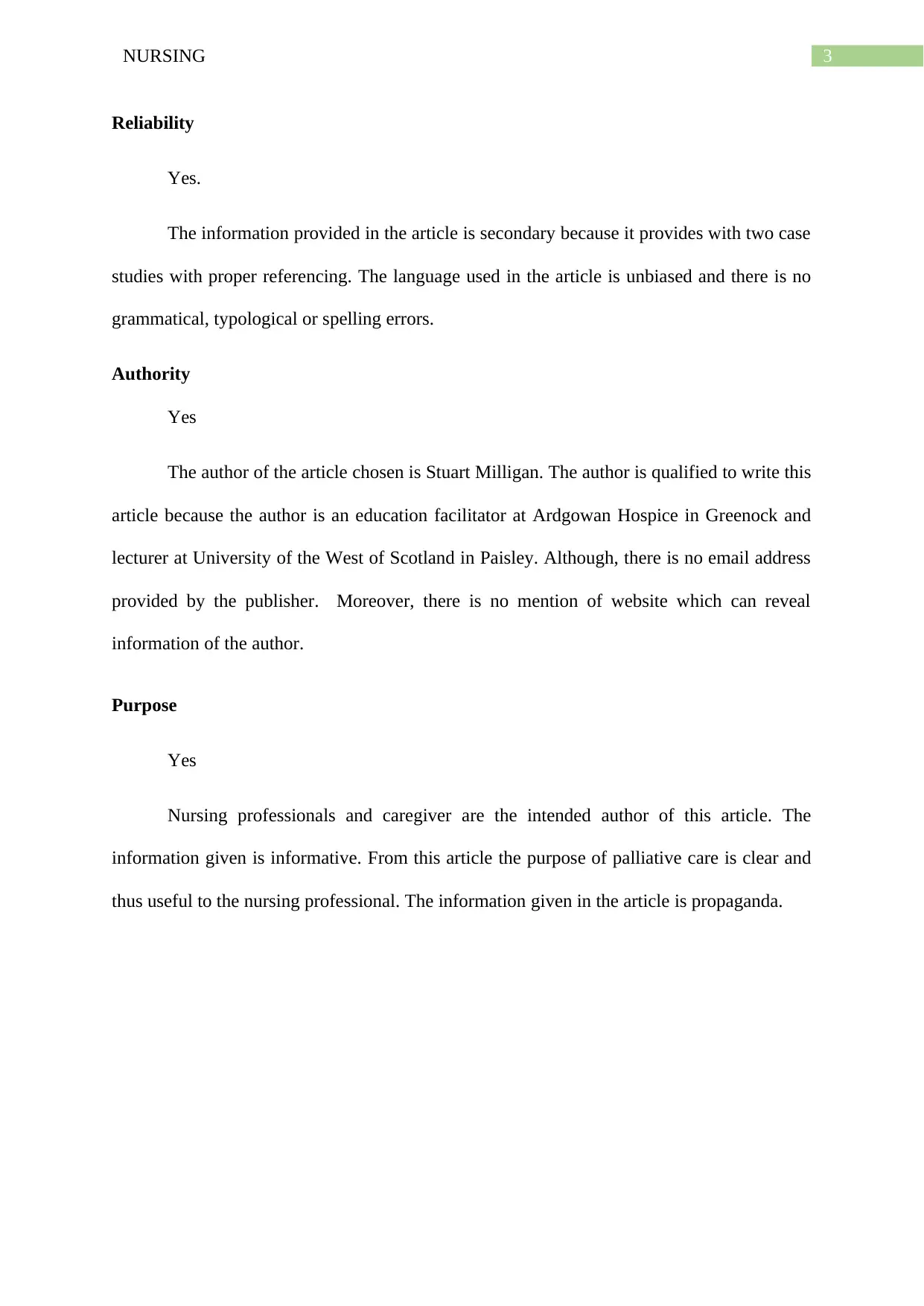
3NURSING
Reliability
Yes.
The information provided in the article is secondary because it provides with two case
studies with proper referencing. The language used in the article is unbiased and there is no
grammatical, typological or spelling errors.
Authority
Yes
The author of the article chosen is Stuart Milligan. The author is qualified to write this
article because the author is an education facilitator at Ardgowan Hospice in Greenock and
lecturer at University of the West of Scotland in Paisley. Although, there is no email address
provided by the publisher. Moreover, there is no mention of website which can reveal
information of the author.
Purpose
Yes
Nursing professionals and caregiver are the intended author of this article. The
information given is informative. From this article the purpose of palliative care is clear and
thus useful to the nursing professional. The information given in the article is propaganda.
Reliability
Yes.
The information provided in the article is secondary because it provides with two case
studies with proper referencing. The language used in the article is unbiased and there is no
grammatical, typological or spelling errors.
Authority
Yes
The author of the article chosen is Stuart Milligan. The author is qualified to write this
article because the author is an education facilitator at Ardgowan Hospice in Greenock and
lecturer at University of the West of Scotland in Paisley. Although, there is no email address
provided by the publisher. Moreover, there is no mention of website which can reveal
information of the author.
Purpose
Yes
Nursing professionals and caregiver are the intended author of this article. The
information given is informative. From this article the purpose of palliative care is clear and
thus useful to the nursing professional. The information given in the article is propaganda.
Paraphrase This Document
Need a fresh take? Get an instant paraphrase of this document with our AI Paraphraser
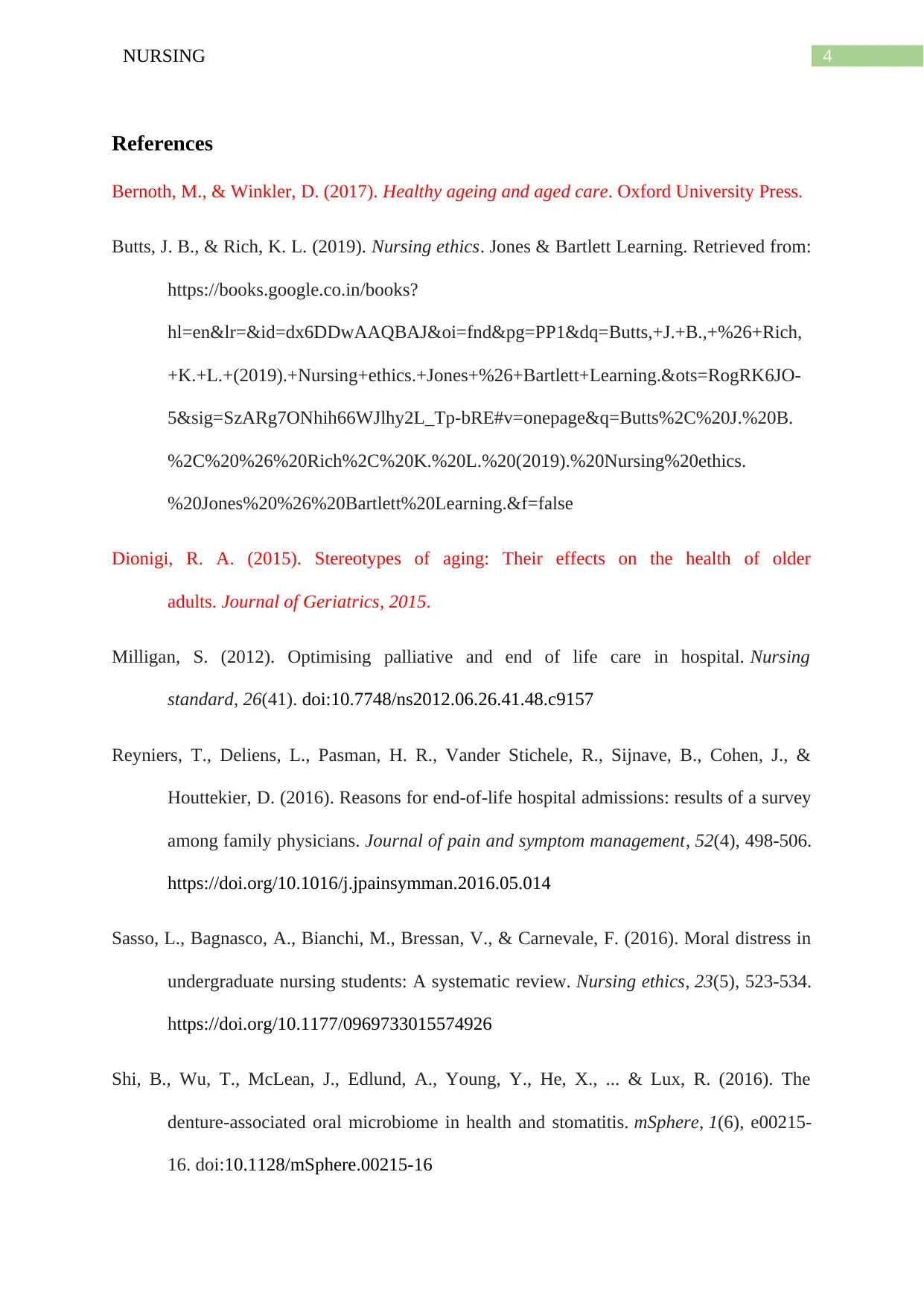
4NURSING
References
Bernoth, M., & Winkler, D. (2017). Healthy ageing and aged care. Oxford University Press.
Butts, J. B., & Rich, K. L. (2019). Nursing ethics. Jones & Bartlett Learning. Retrieved from:
https://books.google.co.in/books?
hl=en&lr=&id=dx6DDwAAQBAJ&oi=fnd&pg=PP1&dq=Butts,+J.+B.,+%26+Rich,
+K.+L.+(2019).+Nursing+ethics.+Jones+%26+Bartlett+Learning.&ots=RogRK6JO-
5&sig=SzARg7ONhih66WJlhy2L_Tp-bRE#v=onepage&q=Butts%2C%20J.%20B.
%2C%20%26%20Rich%2C%20K.%20L.%20(2019).%20Nursing%20ethics.
%20Jones%20%26%20Bartlett%20Learning.&f=false
Dionigi, R. A. (2015). Stereotypes of aging: Their effects on the health of older
adults. Journal of Geriatrics, 2015.
Milligan, S. (2012). Optimising palliative and end of life care in hospital. Nursing
standard, 26(41). doi:10.7748/ns2012.06.26.41.48.c9157
Reyniers, T., Deliens, L., Pasman, H. R., Vander Stichele, R., Sijnave, B., Cohen, J., &
Houttekier, D. (2016). Reasons for end-of-life hospital admissions: results of a survey
among family physicians. Journal of pain and symptom management, 52(4), 498-506.
https://doi.org/10.1016/j.jpainsymman.2016.05.014
Sasso, L., Bagnasco, A., Bianchi, M., Bressan, V., & Carnevale, F. (2016). Moral distress in
undergraduate nursing students: A systematic review. Nursing ethics, 23(5), 523-534.
https://doi.org/10.1177/0969733015574926
Shi, B., Wu, T., McLean, J., Edlund, A., Young, Y., He, X., ... & Lux, R. (2016). The
denture-associated oral microbiome in health and stomatitis. mSphere, 1(6), e00215-
16. doi:10.1128/mSphere.00215-16
References
Bernoth, M., & Winkler, D. (2017). Healthy ageing and aged care. Oxford University Press.
Butts, J. B., & Rich, K. L. (2019). Nursing ethics. Jones & Bartlett Learning. Retrieved from:
https://books.google.co.in/books?
hl=en&lr=&id=dx6DDwAAQBAJ&oi=fnd&pg=PP1&dq=Butts,+J.+B.,+%26+Rich,
+K.+L.+(2019).+Nursing+ethics.+Jones+%26+Bartlett+Learning.&ots=RogRK6JO-
5&sig=SzARg7ONhih66WJlhy2L_Tp-bRE#v=onepage&q=Butts%2C%20J.%20B.
%2C%20%26%20Rich%2C%20K.%20L.%20(2019).%20Nursing%20ethics.
%20Jones%20%26%20Bartlett%20Learning.&f=false
Dionigi, R. A. (2015). Stereotypes of aging: Their effects on the health of older
adults. Journal of Geriatrics, 2015.
Milligan, S. (2012). Optimising palliative and end of life care in hospital. Nursing
standard, 26(41). doi:10.7748/ns2012.06.26.41.48.c9157
Reyniers, T., Deliens, L., Pasman, H. R., Vander Stichele, R., Sijnave, B., Cohen, J., &
Houttekier, D. (2016). Reasons for end-of-life hospital admissions: results of a survey
among family physicians. Journal of pain and symptom management, 52(4), 498-506.
https://doi.org/10.1016/j.jpainsymman.2016.05.014
Sasso, L., Bagnasco, A., Bianchi, M., Bressan, V., & Carnevale, F. (2016). Moral distress in
undergraduate nursing students: A systematic review. Nursing ethics, 23(5), 523-534.
https://doi.org/10.1177/0969733015574926
Shi, B., Wu, T., McLean, J., Edlund, A., Young, Y., He, X., ... & Lux, R. (2016). The
denture-associated oral microbiome in health and stomatitis. mSphere, 1(6), e00215-
16. doi:10.1128/mSphere.00215-16
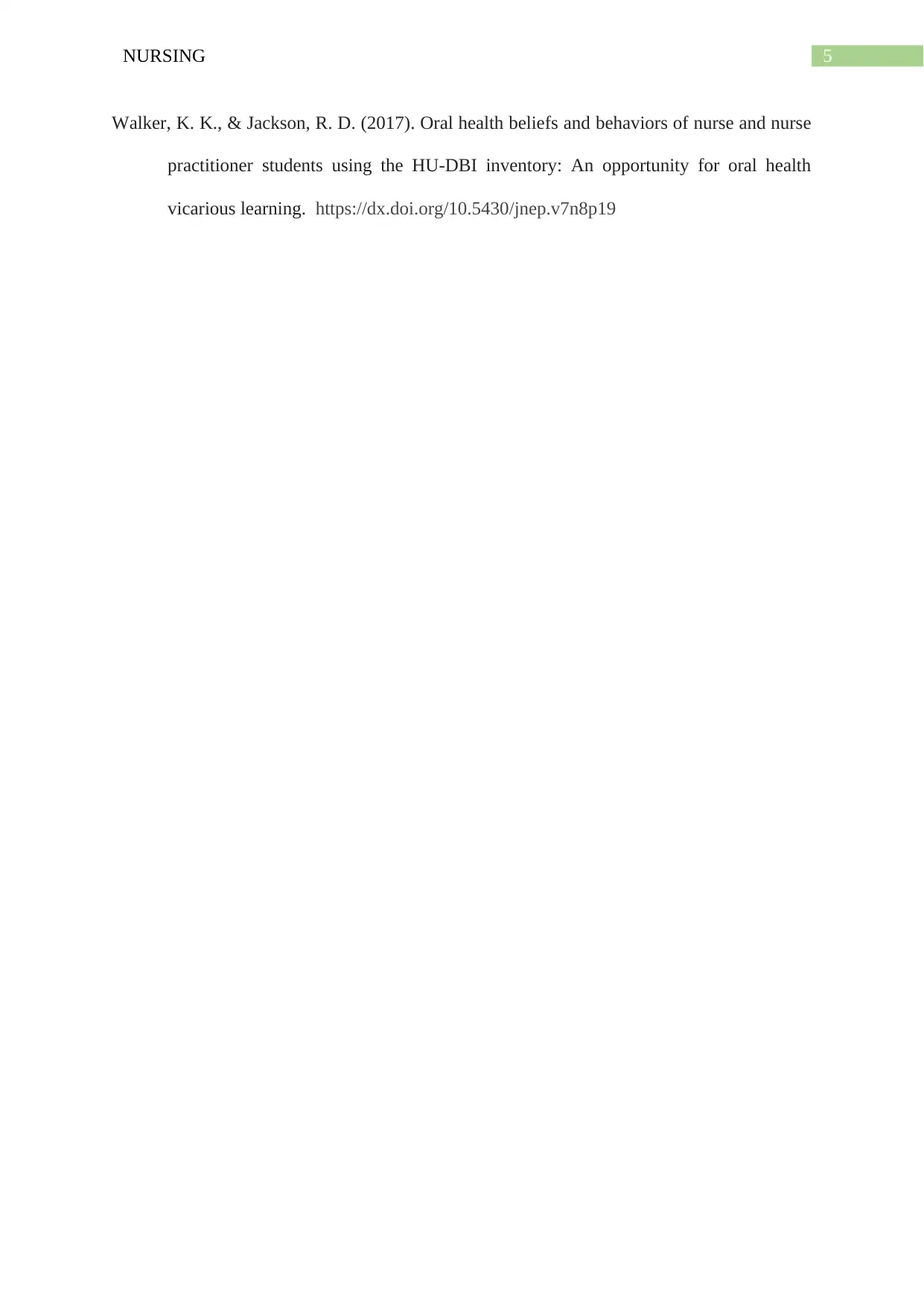
5NURSING
Walker, K. K., & Jackson, R. D. (2017). Oral health beliefs and behaviors of nurse and nurse
practitioner students using the HU-DBI inventory: An opportunity for oral health
vicarious learning. https://dx.doi.org/10.5430/jnep.v7n8p19
Walker, K. K., & Jackson, R. D. (2017). Oral health beliefs and behaviors of nurse and nurse
practitioner students using the HU-DBI inventory: An opportunity for oral health
vicarious learning. https://dx.doi.org/10.5430/jnep.v7n8p19
⊘ This is a preview!⊘
Do you want full access?
Subscribe today to unlock all pages.

Trusted by 1+ million students worldwide
1 out of 6
Related Documents
Your All-in-One AI-Powered Toolkit for Academic Success.
+13062052269
info@desklib.com
Available 24*7 on WhatsApp / Email
![[object Object]](/_next/static/media/star-bottom.7253800d.svg)
Unlock your academic potential
Copyright © 2020–2026 A2Z Services. All Rights Reserved. Developed and managed by ZUCOL.





